Ths peer reviewed article was first published in the journal Tuith OnlineDental health behaviour of Scottish dentate adults(based on the 1998 Adult Dental Health Survey) by Nigel M. Nuttall, Dental Health Services Research Unit This article is part 1 of 4 of an invited article series. View parts 2 to 4. This article examines the dental health behaviour of Scottish dentate adults. Attending for Regular Dental Check-upsA key behavioural indicator that has been used since the first survey of adult dental health of England and Wales in 1968 is whether people say they go to a dentist for a regular dental check-up, an occasional dental check-up or only when they have trouble with their teeth. The proportion of dentate adults who claim to attend for regular dental check-ups has risen from a third in 1972 to over a half (55%) in 1998 (Figure 1). However, the Scottish average in 1998 was 5% behind that reported in England. It is notable that attending for check-ups is lowest among the youngest age group. In some respects this gives a misleading impression as seeking check-ups has been shown by these surveys to be strongly related to retaining teeth and those who have poorer dental health in each age group gradually drop out through becoming edentate, leaving a progressively higher proportion of those who are more dentally motivated. It may be of concern, however, that there is a slight fall in the percentage of 16-24 year olds claiming to go for regular dental check-ups from the level in 1988. The main reason for the overall improved level of attendance seems to be a marked increase in the proportion of people over 45 who now claim to attend for dental check-ups; in 1988 44-47% of adults over 45 claimed to go for a regular check-up whereas in 1998 60-62% claimed to do so. Figure 1. Attendance for regular check-ups among dentate adults in Scotland 1998 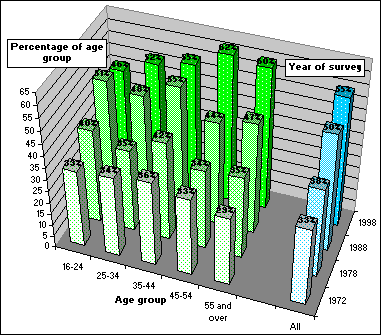
People from the most deprived areas were much less likely to claim to go for regular check-ups than those from well-off areas; 70% of those from DEPCAT1 areas said they went for regular check-ups in comparison with only 28% of those from DEPCAT6 and DEPCAT7 areas. Over half of the least well off said they only went to a dentist when they had some trouble with their teeth. Figure 2. Self-reported dental attendance by deprivation category (DEPCAT score) in Scotland in 1998 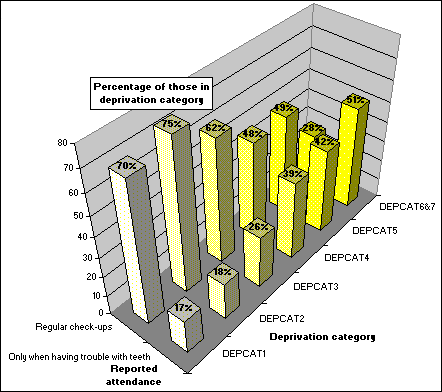
The participants in the survey were also given a list of statements about factors that are related to dental attendance. In figure 3 the 'odds ratio' of each answer having been given by a person from the most deprived areas compared with a person from the most affluent areas is given. A high odds ratio indicates a bigger difference between the responses from different groups. Cost of dental treatment appeared to be the main concern of people from the most deprived areas. People in the most deprived areas were over 4 times more likely to be concerned about aspects of dental treatment costs than those from the most affluent areas. The poorest were also more than twice as likely as those from the most affluent areas to agree that they would rather not have 'fancy treatment' or visit a dentist unless they could see a definite need to. Figure 3. Barriers to dental attendance perceived by those living in the most deprived in (DEPCAT 6 and 7) of Scotland 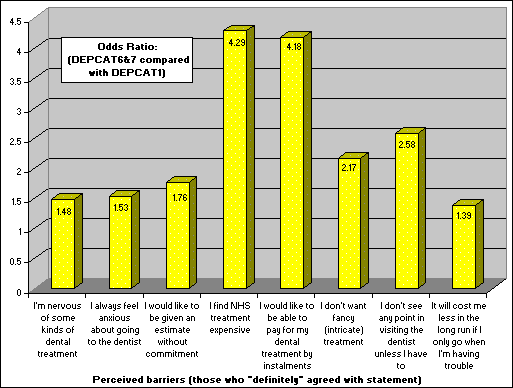
Tooth CleaningThere has been no significant change in reported frequency of cleaning teeth among Scots since 1988 (figure 4); 70% of the dentate population report cleaning their teeth at least twice a day in 1998 compared with 69% in 1988. Findings reported elsewhere in the 1998 survey report showed that there was no relationship between reported frequency of brushing and effective plaque removal; those who said they brushed twice a day or more often were as likely to have some plaque in their mouths when they were dentally examined as those who said they brushed less often. Figure 4. Total cleaning behaviour of dentate adults by country and year of survey 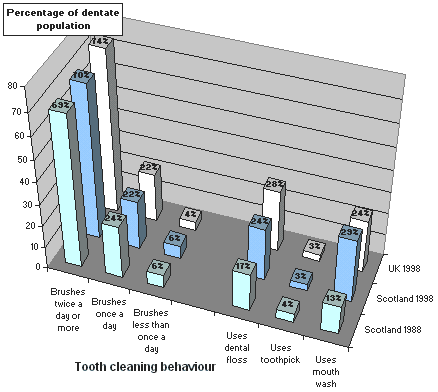
People were also asked if they used any additional methods for cleaning their teeth. The use of dental floss has slightly increased, but nothing like the increase in reported use of mouthwash which has more than doubled (from 13% to 29%) since the last survey. Indeed, Scots in 1998 were more likely to report using mouthwash than the UK average. It has been shown that people living in areas where there is a high level of material deprivation are less likely to attend for regular dental care than those in the most affluent areas and that cost is perceived as a major factor. However, looking at tooth cleaning behaviour shows that not all dental behaviours of those who live in the most deprived areas are a simple function of costs. Figure 5 shows that people who live in DEPCAT areas 6 and 7 were less likely to say they brushed their teeth twice a day or more than those living in DEPCAT area 1. They were also much less likely to say they used dental floss; only 9% of those in DEPCAT areas 6 and 7 said they used floss in comparison with around 40% of those living in DEPCAT areas 1 and 2. However, the opposite is the case with the use of mouthwash, almost a third of those living in the poorest areas said they used mouthwash compared with around 20% of those in the two most affluent areas. Figure 5. Tooth cleaning behaviour by deprivation category (DEPCAT) in Scotland 1998 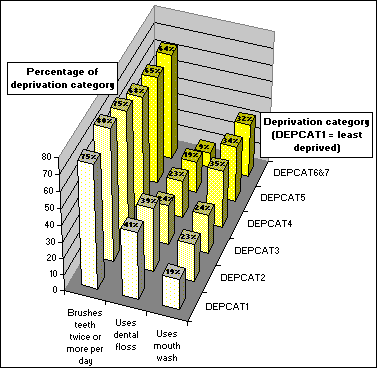
The national surveys of adult oral health traditionally only make limited comments about findings such as the above. There are a variety of reasons why those in poorer areas may use mouthwash to a greater than average extent. Nevertheless, the findings show that those living in the most deprived areas do feel the need for some agent to affect their oral condition and perhaps more importantly are prepared to spend money on such an agent. As with issues in diet there may be arguments that better and cheaper alternatives exist to the products that are being bought. But these rest on making judgements about what the product is providing for the purchaser. Mouthwash seems to be taking on a significant value to many people living in the most deprived areas. Thanks and DisclaimersThe DHSRU would like to thank all the dentists and interviewers who often worked unsocial hours to undertake the dental examinations and people who gave their time to be interviewed and dentally examined. This work was undertaken by a consortium comprising the Office for National Statistics and the Dental Schools of the Universities of Birmingham, Dundee, Newcastle and Wales who received funding from the United Kingdom Health Departments; the views expressed in this publication are those of the author and not necessarily those of the Health Departments nor of the other members of the consortium. Nigel Nuttall acknowledges support from the Chief Scientist Office of the Scottish Executive who do not necessarily share the views expressed. |
|
Web space provided by the University of Dundee,
maintained by
the Dental Health Services Research Unit. Valid XHTML1.0
|
 |
Evidence-based dentistry web-site | |